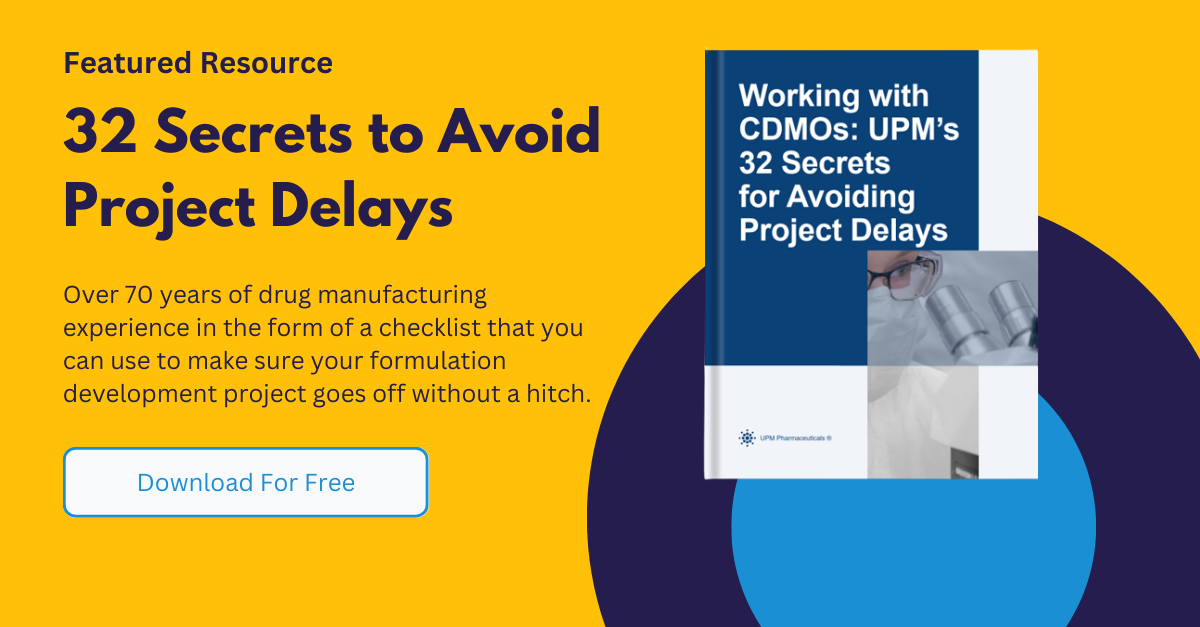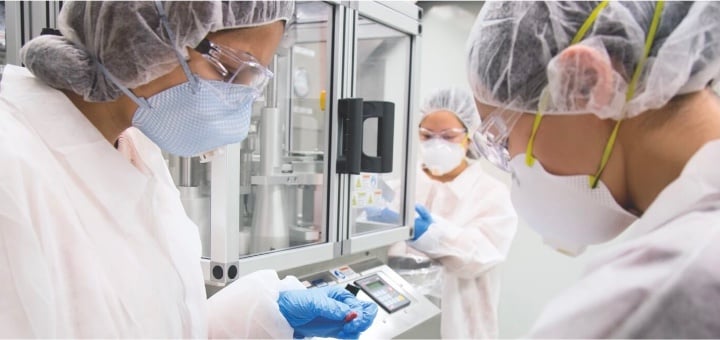Pharmaceutical contract manufacturing offers benefits such as cost reduction, increased production capacity, and the ability to focus on core activities like drug discovery and marketing. However, it also has potential drawbacks, including a lack of control over compliance and potential interruptions in production.
CMOs and CDMOs must adhere to FDA good manufacturing practices and comply with regulatory requirements.
CMO VS CDMO: What's the Difference?
In the realm of pharmaceutical contract manufacturing, distinguishing between a Contract Manufacturing Organization (CMO) and a Contract Development and Manufacturing Organization (CDMO) is critical, as each provides distinct services within drug development and production.
A CMO, or pharmaceutical contract manufacturer, primarily provides contract manufacturing services, focusing on the production of drugs based on the client's formula. Their role is essential in the manufacturing processes, ensuring the smooth, efficient production of pharmaceuticals to meet market demands.
On the other hand, a CDMO provides more comprehensive services, covering both contract development and manufacturing. These organizations not only produce drugs but also engage in the development process, collaborating closely with contract research organizations and the client. This integration streamlines the drug development process, providing a seamless transition from research to production.
Both CMOs and CDMOs play a pivotal role in the pharmaceutical industry, offering flexibility and efficiency. They allow pharmaceutical companies the freedom to focus on their core competencies while ensuring high-quality drug production.
It is, therefore, crucial to understand the difference between these entities when considering outsourcing options in pharmaceutical contract manufacturing.
The Pharmaceutical Contract Manufacturing Process
Diving into the intricacies of the pharmaceutical contract manufacturing process, it's essential to understand that each drug, with its unique formula, undergoes a specific, meticulously controlled procedure divided into four fundamental steps: blending, coating, serialization, and shipment.
- In blending, contract manufacturers meticulously combine active and non-active ingredients. Precision is vital, establishing consistency and stability in the drug's formula.
- The coating stage enhances the drug's taste, color, and handling characteristics without altering its composition. The drug's formula, whether water- or solvent-based, informs the coating parameters.
- Serialization represents the regulatory requirements aspect of the manufacturing process. Here, each saleable unit acquires a unique serial number, ensuring traceability and compliance with the Drug Supply Chain Security Act.
- Shipment, the final stage, involves getting the drugs to the client and consumers. Contract manufacturers adhere to strict packaging and serialization guidelines, ensuring timely, safe, and efficient delivery of pharmaceutical products.
These four steps, executed within state-of-the-art manufacturing facilities, highlight the sophistication and precision underlying the pharmaceutical contract manufacturing process. This process, rooted in best manufacturing practices, ensures that manufacturing operations meet high-quality standards while adhering to stringent regulatory requirements.
CMO and CDMO Safety Regulations
Having discussed the intricate steps involved in the pharmaceutical contract manufacturing process, we must now shift our attention toward the stringent safety regulations that Contract Manufacturing Organizations (CMOs) and Contract Development and Manufacturing Organizations (CDMOs) must adhere to. Regulatory agencies, such as the FDA, enforce strict safety regulations that these organizations must follow.
A key component of these regulations is the quality agreement between the pharmaceutical companies and the contract manufacturing organization. This agreement details the roles and responsibilities of each party, ensuring transparency and regulatory compliance.
Pharmaceutical manufacturing also involves adherence to the Current Good Manufacturing Practice (CGMP) regulations. CGMP guidelines ensure that manufacturing processes are controlled, and the finished products meet specified quality standards.
| Regulatory Compliances | Safety Regulations |
|---|---|
| Quality Agreement | CGMP guidelines |
| FDA oversight | Hazard control |
| Role clarity | Equipment calibration |
Benefits of Using a CDMO
Engaging the services of a Contract Development and Manufacturing Organization (CDMO) offers a myriad of benefits for pharmaceutical companies. These benefits include cost and risk reduction, scalability, access to specialized expertise and technology, and enhanced flexibility and specialization.
This option for pharmaceutical contract manufacturing not only provides an avenue for cost savings but also supports the production of high-quality products. The advantages of outsourcing services to a contract manufacturer are multi-fold:
- Cost and Risk Reduction: CDMOs minimize financial risks and accelerate speed to market. They possess specialized equipment and experienced staff, thereby eliminating the need for heavy investment and the risk of non-approval.
- Scalability: CDMOs provide the ability to scale production volumes or make changes swiftly to meet increased demand, thereby reducing lead times.
- Access to Expertise and Technology: CDMOs offer state-of-the-art technology and a highly skilled workforce, allowing pharmaceutical companies to leverage specialized expertise without massive infrastructural investment.
- Flexibility and Specialization: CDMOs enable pharmaceutical companies to remain agile and innovative without compromising product quality. This results in economies of scale and the production of specialized, high-quality products.
FAQ
What is a contract manufacturer in pharma?
A contract manufacturer in pharma is a company that produces pharmaceutical products for other companies. They provide manufacturing services under the client's label or brand.
What is pharmaceutical contract manufacturing process?
The pharmaceutical contract manufacturing process involves the outsourcing of drug production to third-party manufacturers. It encompasses the use of advanced technologies such as artificial intelligence and machine learning to optimize various stages of drug development and manufacturing. These technologies, including natural language processing, are increasingly being leveraged to automate and improve processes within the pharmaceutical industry.
CONTACT US
Partner with a Qualified CDMO: UPM Pharmaceuticals
Bringing a new drug to market is a lengthy, costly, and risky journey, compounded with the time pressure of being first in the marketplace. UPM is unlike other CDMOs because we are a large pharma supplier and an independent, family-owned CDMO, allowing us greater flexibility in our partnerships. To this point, our ended-to-end CDMO services have helped bring over 80 pharma products to market.
Our state-of-the-art seven-acre pharmaceutical campus features our commercial manufacturing and packaging site, commercial warehouse, and DEA-Approved vault. With extensive pharmaceutical industry experience and a solid track record of bringing drug products to market, our capabilities are the best that commercial pharma has to offer. Contact UPM to learn more about our contract development and manufacturing organization and how we can optimize your pharmaceutical project results.
Connect with Our CDMO Services

